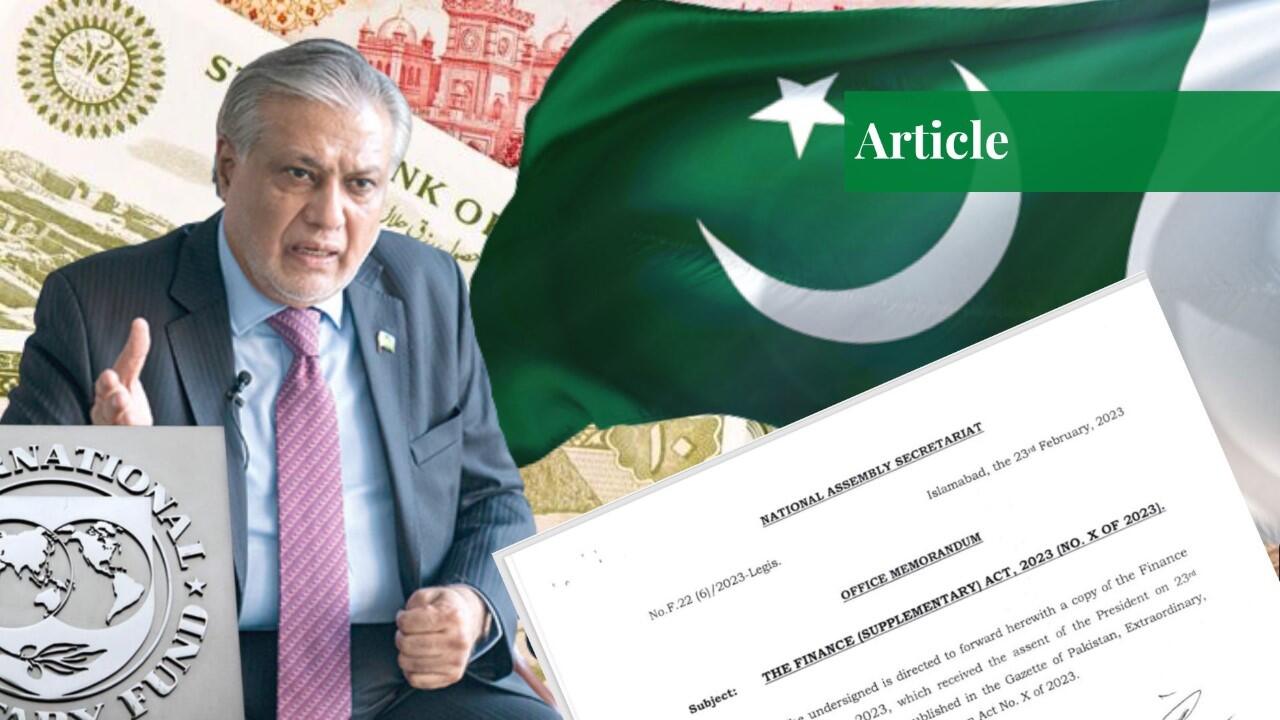Ms Afifa Iqbal has a keen interest in identity politics, colonialism and post-colonial development. She is currently working as a Research Assistant at ITU while pursuing her postgraduate studies in Development, Technology and Policy. She is a Gold Medalist in Political Science from the University of Punjab.
Understanding Budgets in Pakistan
“Budgets are moral documents. They reveal priorities and values, and as a society, they are the primary way that we care for one another, especially for the vulnerable.” – Fr. Travis Russell, SJ
By this standard, if we look at the federal budgets, both the previous as well as the current 2023 mini-budget of Pakistan, the priorities of the government become clear. Whether the government is of Imran Khan or Nawaz Sharif, the budgets have reflected, year in and year out, the same values with slight variations.
Some sectors are reflective of protected interests and hence, cannot be touched. Other sectors can easily be given the axe when lenders come a-knocking. The emperor has no moral clothes whatsoever, but let us all pretend that he is wearing a moral ensemble threaded with performative religiosity.
Pakistan’s history is replete with economic crises which are largely a product of political chaos and myopic policies. In the recent past, the budget speeches of finance ministers have followed the same tired three-part narrative structure: the treasury coffers were emptied out by the previous government, the tough measures being taken are necessary to put the economy back on track, and all this is being done for the good of the public. Except for the part where it is neither for the public’s good nor does it necessarily put the economy back on track.
The current Finance (Supplementary) Bill, 2023 (termed as mini-budget) has caused quite an uproar because of the increase in indirect taxes without broadening the tax base in Pakistan. However, before analyzing the Finance (Supplementary) Bill, 2023, let’s take stock of the budgetary process and the need for the Bill.
Budgetary Process
In Pakistan, the fiscal year commences on July 1st and concludes on June 30th of the following year. According to Article 80 (1) of the constitution, the federal government “shall, in respect of every financial year, cause to be laid before the National Assembly a statement of the estimated receipts and expenditure of the Federal Government for that year, in this Part referred to as the Annual Budget Statement.”
Article 80(2) requires that the Annual Budget Statement distinguishes between “charged expenditures” and “other expenditures”. Charged expenditures, otherwise known as “Authorized Expenditure”, are exempted from parliamentary voting but can be discussed by the members of the parliament. They include compensation packages of the President, the Supreme Court Justices, and the Chief Election Commissioner, among others.
The Finance Ministry makes budget suggestions to the Cabinet. After the approval of the Cabinet, the Finance Minister presents the Annual Budget Statement before the National Assembly and delivers his budget speech. After budget discussions, there is a vote of account and if passed, the Finance Bill is sent to the Senate.
Article 73(1) necessitates that the statement be presented to the Senate for approval. For its part, the Senate can make suggestions/comments on the proposed Annual Budget Statement within a seven-day period. However, these comments and suggestions are not binding upon the National Assembly. Finally, the bill is sent for the assent of the President.
According to a knowledge brief published by the Pakistan Institute of Development Economics in 2021, the whole budgetary process suffers from three key issues: the restricted role of the parliament, the pre-eminence of the bureaucracy in the formulation of the budget, and the limited window of time available for the whole process.
“Among the elected executives, it is only the Finance Minister and Minister of State in some cases who are somewhat involved in budget making. Even the cabinet which has to take the collective responsibility of all the government decisions is made to bless the budget as decorum just few hours before the budget is formally presented in the parliament. The present parliamentary budget process which hardly runs for around two weeks offer very little time for the elected representatives to either shape or meritoriously review the budget.”
The Need for the Finance (Supplementary) Bill, 2023
In a bid to revive the IMF program, the Federal Board of Revenue issued two SROs on the 14th of February thereby increasing Federal Excise Duties and General Sales Tax. The next day, the federal government introduced the Finance (Supplementary) Bill, 2023 in both houses of the Parliament recommending taxation measures of Rs 170 billion.
The bill was passed by the lower house on 20th February, 2023 and received the assent of President Dr. Arif Alvi on 23rd February, 2023. The Finance Supplementary Act has hiked up the general sales tax from 17% to 18%, while for luxury items the increase is accounted to be up to 25% from 17%.
The Act has also increased the federal excise duty on aerated waters, sugary drinks, cigarettes, business and first-class airline tickets, marriage halls, and cement. Moreover, there is also an increase in the sales tax applicable on locally sourced coal as well as imported mobile phones.
Aside from this, one welcome step was the increase in BISP allocation from Rs 360 billion to Rs 400 billion. It is no secret that the federal government has taken this step to fulfill the requirements of the IMF for resuming its bailout package. Earlier, the federal government also increased gas prices for domestic consumers by up to 124% in a bid to generate a revenue of Rs 310 billion from consumers during the first six months of 2023 (January-June).
To say that these steps will cumulatively impact the poor and the middle class in an adverse manner would still be an understatement. These government policies threaten the very survival of these classes. While presenting the 2023 mini-budget, Finance Minister Ishaq Dar lambasted the policies of the previous government and floated the idea of forming a national committee to probe into the conduct of the previous government and its many failures that have landed Pakistan in such dire straits.
While one must laud the idea of a national accountability committee and the impassioned rhetoric of the Finance Minister, it must be asked: will the Finance Minister be willing to investigate himself? After all, his blasé attitude towards the demands of the Fund for resuming the bailout package is no secret. It was only in December that he was claiming in Geo News’ programme “Aaj Shahzeb Khanzada Kay Saath” that if IMF did not agree with the terms and conditions of the government, then he would not beg the Fund and that he did not care whether the IMF releases funds or not.
This bravado would have been much appreciated if the Finance Minister had followed through with his declaration that Pakistan would manage even without the cash influx from the Fund. However, the Finance Minister’s misguided bordering on criminal negligence notions only led to fast-depleting foreign exchange reserves with the country being on the brink of default.
The current Finance (Supplementary) Act is a stark reminder of his failure. Not only should the prices of petroleum products have been increased earlier, but steps should have been taken to broaden the tax base. Also, the federal government should have focused on increasing direct taxes rather than indirect taxes. Neither of these suggestions is new.
The consultants and policy advocates have been clamoring for years—decades even—to broaden the tax net and increase direct taxation, but the federal government has not paid attention to either of these suggestions. The protected interests are not to be touched. The charged expenditures are not to be voted upon. The subsidies to robber barons are not to be discontinued. And the Seths and their businesses are not to pay taxes because of the biraderi linkages. So, the only choices left are the salaried middle class and the poor underclass. They have been bearing the brunt of the government’s misguided policies and politically expedient yet economically disastrous actions, and they will continue to do so.
So, should people stop asking questions? Should they stop demanding a development-centric and pro-poor budget that taxes the rich? Should all hope for a participatory budgetary process that does not protect the so-called ‘holy cows’ be abandoned? Should nobody object to blatant attempts by political parties to run the country like a dynasty by appointing incompetent egoists to key positions? The questions need to be asked, and they need to be asked time and again. In fact, the questions must be asked until they are answered.
Conclusion
Rome was not built in a day, but Rome was also not destroyed in a day—those at the helm of power should understand this. Furthermore, those who keep peddling the idea that Pakistan will inevitably recover because of its geostrategic importance and nuclear status need to take a long and hard look at the current economic crisis and disabuse themselves of this notion.
If you want to submit your articles, research papers, and book reviews, please check the Submissions page.
The views and opinions expressed in this article/paper are the author’s own and do not necessarily reflect the editorial position of Paradigm Shift.



















